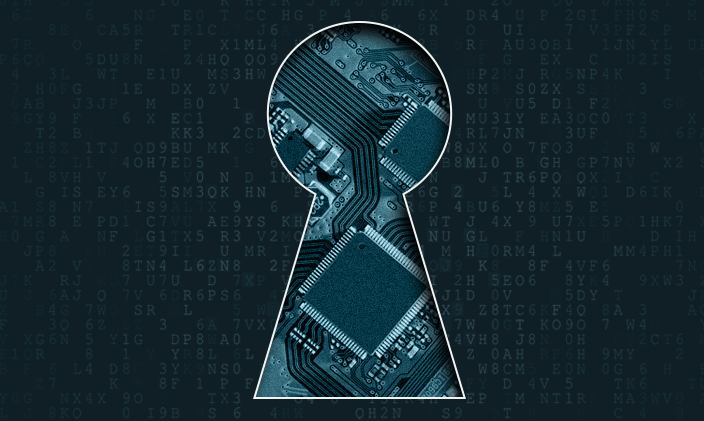Articles > Cybersecurity > What is cryptography?
What is cryptography?

Written by Michael Feder

Reviewed by Kathryn Uhles, MIS, MSP, Dean, College of Business and IT

At its core, the practice of encoding and decoding messages is used to prevent unauthorized access. This concept has existed for thousands of years, and its evolution has been shaped by human ingenuity and the changing landscape of technology.
The history of cryptography
In ancient times, cryptography was used as a means of communication between military commanders during times of war. One of the earliest examples of encryption was the Caesar Cipher, invented by Julius Caesar more than 2,000 years ago. This simple encryption technique involved shifting each letter in a message by a fixed number of positions down the alphabet. The key, or the number of positions shifted, was known only to the sender and the recipient.
Fast-forward to the modern era where it has become an integral part of our daily lives. The technique uses mathematical techniques to shape data and prevent it from being seen, used or changed by unauthorized parties. We use it to protect our online transactions, secure our communications and guard our personal information.
How is cryptography used in cybersecurity?
Cryptography is a technique that is often used in cybersecurity to protect information. It relies on algorithms to encode data so that only someone with the correct key can decode it. This key could be a password, a physical key or another type of secret code.
The purpose of encrypting data is to make it difficult for unauthorized individuals to access it, even if they intercept it. Securing this data is an essential part of cybersecurity, and is one of the main techniques to protect data from unauthorized access.
Cryptography can be broadly divided into two categories: symmetric-key and public-key. In symmetric-key, the same secret key is used for both encryption and decryption. The sender and the receiver must share the same key, which can be challenging in situations where the parties have never met.
On the other hand, public-key or asymmetric, involves the use of two keys — a public key and a private key. The public key used to encrypt messages is freely available. The private key, which is kept secret, is used to decrypt the messages. The technique has revolutionized the industry by making it possible for secure communication to take place over insecure networks.
Where is cryptography is used
This data security method has been leveraged across a wide variety of industries including:
E-commerce
It has numerous applications in the modern world, most notably in online security. With the rise of e-commerce and online banking, there is a greater need for secure transactions over the internet. It is used to protect the transmission of sensitive data such as credit card numbers, passwords and other personal information.
Military
It's still used in military and intelligence operations. During times of war, it can make the difference between victory and defeat. Governments and militaries use sophisticated encryption techniques to protect their communication and keep their strategies secret.
Intellectual property
In the field of digital rights management, it is used to protect digital content such as music, movies and books from unauthorized access and distribution.
Types of cryptography
Cryptography encompasses a variety of techniques and algorithms. The most common techniques include a secret key, a public key and hash functions.
Secret key
A secret key is a piece of information or framework used to encrypt and decrypt messages. Each participant in a private communication has access to a shared secret key. The system’s level of security depends on both the strength of the encryption algorithm and the secrecy of the key. The key must be known only to the sender and receiver of the message. If the key is compromised, the security of the system is compromised.
Public key
A public key is a large numerical cryptographic key used to scramble data. Unlike a secret key, which is kept private, the public key is shared with everyone in the network. The only way to decrypt a message using one key is to use the second key. This is often used in online banking, email and file-sharing applications.
Hash functions
Hash functions are algorithms that accept inputs of any size and generate what is known as a hash, or a fixed-length output. Hash functions are intended to be one-way, meaning it is difficult or impossible to reverse the process and use the hash to determine the original input. This makes them helpful in verifying a data set has not been tampered with or corrupted. They are also used in digital signatures and to protect passwords.
Careers in cryptography
A career in cryptography can involve various tasks, such as designing and implementing encryption algorithms and protocols, developing software that uses cryptographic techniques, auditing systems for security vulnerabilities or researching new cryptographic algorithms.
As technology becomes more sophisticated, the need for professionals in this area will only continue to grow, which means jobs may become increasingly available. For example, demand for information security analysts is projected to grow by 32% from 2022 to 2032, according to the U.S. Bureau of Labor Statistics.
BLS Occupational Employment Projections, 2022-2032 is published by the U.S. Bureau of Labor Statistics. This data reflects BLS’ projections of national (not local) conditions. These data points are not specific to University of Phoenix students or graduates.
To pursue a career in cryptography, individuals should be comfortable with math and computer programming. For example, to become an information security analyst, a bachelor’s degree in computer science, information technology or a related field is often recommended. Professional certification may also be required.
IT graduate-level programs often teach encryption and cryptography methods. Graduate-level programs can offer advanced courses. They can also give students research opportunities to learn more about specific topics to better prepare for a professional setting.
Many more options are available, such as online courses, boot camps and self-study materials.
Learn more about cryptography and cybersecurity
Whether you’re interested in cryptography, are seeking to gain a basic understanding of information technology or cybersecurity, or are a working professional looking to expand your skill set, University of Phoenix offers online technology programs and courses including:
- Associate of Arts in Information Technology
- Bachelor of Science in Information Technology
- Bachelor of Science in Computer Science
- Bachelor of Science in Cybersecurity
- Certified Ethical Hacker Course Collection
- Certified Incident Handler Course Collection
- Certified Network Defender Course Collection
- Computer Hacking Forensics Investigator Course Collection
Contact a University of Phoenix representative for more information.

ABOUT THE AUTHOR
A graduate of Johns Hopkins University and its Writing Seminars program and winner of the Stephen A. Dixon Literary Prize, Michael Feder brings an eye for detail and a passion for research to every article he writes. His academic and professional background includes experience in marketing, content development, script writing and SEO. Today, he works as a multimedia specialist at University of Phoenix where he covers a variety of topics ranging from healthcare to IT.

ABOUT THE REVIEWER
Currently Dean of the College of Business and Information Technology, Kathryn Uhles has served University of Phoenix in a variety of roles since 2006. Prior to joining University of Phoenix, Kathryn taught fifth grade to underprivileged youth in Phoenix.
This article has been vetted by University of Phoenix's editorial advisory committee.
Read more about our editorial process.


Get your free IT Program Guide
Learn how 100% of our IT degree and certificate programs align with career-relevant skills.
Thank you
Download your pdf guide now. Or access the link in our email.


